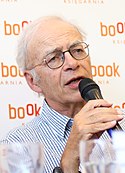Peter Singer Quote
The Western principle of the sanctity of human life—a principle which is unique in the sharpness with which it separates the wrongness of taking the life of any human being, no matter how severely defective, from the wrongness of taking the life of any non-human animal, no matter how intelligent—can, as I have argued elsewhere, be explained as the legacy of the Judeo-Christian world view, in which humans, but not animals, are made in the image of God and have immortal souls. For those of us who do not accept the authority of the Judeo-Christian religions, this explanation should lead to a critical re-examination of our belief in the sanctity of all and only human life. One
Peter Singer
The Western principle of the sanctity of human life—a principle which is unique in the sharpness with which it separates the wrongness of taking the life of any human being, no matter how severely defective, from the wrongness of taking the life of any non-human animal, no matter how intelligent—can, as I have argued elsewhere, be explained as the legacy of the Judeo-Christian world view, in which humans, but not animals, are made in the image of God and have immortal souls. For those of us who do not accept the authority of the Judeo-Christian religions, this explanation should lead to a critical re-examination of our belief in the sanctity of all and only human life. One
Related Quotes
About Peter Singer
Peter Albert David Singer (born 6 July 1946) is an Australian moral philosopher who is Emeritus Ira W. DeCamp Professor of Bioethics at Princeton University. Singer's work specialises in applied ethics, approaching the subject from a secular, utilitarian perspective. He wrote the book Animal Liberation (1975), in which he argues for vegetarianism, and the essay "Famine, Affluence, and Morality", which argues the moral imperative of donating to help the poor around the world. For most of his career, he was a preference utilitarian. He revealed in The Point of View of the Universe (2014), coauthored with Katarzyna de Lazari-Radek, that he had become a hedonistic utilitarian.
On two occasions, Singer served as chair of the philosophy department at Monash University, where he founded its Centre for Human Bioethics. In 1996, he stood unsuccessfully as a Greens candidate for the Australian Senate. In 2004, Singer was recognised as the Australian Humanist of the Year by the Council of Australian Humanist Societies. In 2005, The Sydney Morning Herald placed him among Australia's ten most influential public intellectuals. Singer is a cofounder of Animals Australia and the founder of the non-profit organization The Life You Can Save.
On two occasions, Singer served as chair of the philosophy department at Monash University, where he founded its Centre for Human Bioethics. In 1996, he stood unsuccessfully as a Greens candidate for the Australian Senate. In 2004, Singer was recognised as the Australian Humanist of the Year by the Council of Australian Humanist Societies. In 2005, The Sydney Morning Herald placed him among Australia's ten most influential public intellectuals. Singer is a cofounder of Animals Australia and the founder of the non-profit organization The Life You Can Save.
